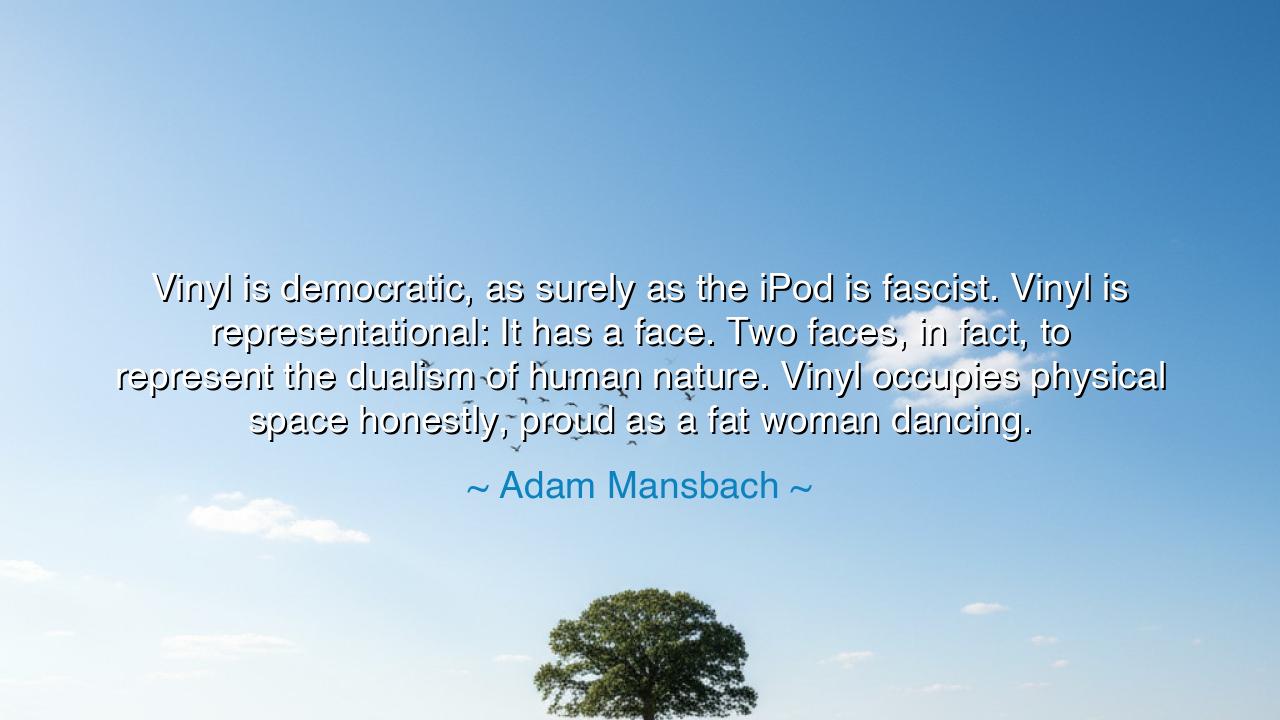
Vinyl is democratic, as surely as the iPod is fascist. Vinyl is
Vinyl is democratic, as surely as the iPod is fascist. Vinyl is representational: It has a face. Two faces, in fact, to represent the dualism of human nature. Vinyl occupies physical space honestly, proud as a fat woman dancing.






"Vinyl is democratic, as surely as the iPod is fascist. Vinyl is representational: It has a face. Two faces, in fact, to represent the dualism of human nature. Vinyl occupies physical space honestly, proud as a fat woman dancing." These are the words of Adam Mansbach, whose words strike at the heart of a battle between two worlds—one that honors the tangible and honest, and another that seeks to condense the essence of existence into a neat, digital package. The weight of this statement reaches far beyond the medium of music itself; it speaks to the nature of freedom, authenticity, and the relationship between the individual and the masses. It is a profound reflection on the journey of humanity through the ages, where our art, our music, and our experiences are both immersed in, and yet separated by, the evolving forms of technology.
In the ancient days, the art of the people was present and real—it occupied space, it was an expression of the individual and the community alike. Consider the sculptures of ancient Greece, the great marble statues that captured the form and spirit of both gods and men. These works, proud and full of life, stood not in the abstract, but firmly in the world of the physical—they demanded attention, they spoke to the senses, and in doing so, they connected the soul of the artist to the soul of the viewer. Vinyl, in its essence, carries this spirit forward. It is representational, offering not merely a sound, but a physical object that speaks to us directly—that shares space with us. It is not an invisible force, like the digital file that streams through our earbuds; it is real, it occupies the world, and in doing so, it reminds us of the honesty of presence.
Mansbach’s words contrast vinyl with the iPod, a device that he calls fascist, a symbol of the digital age that seeks to condense and control the experience of music, as though art could be manipulated into a flawless, impersonal form. The iPod, sleek and minimalist, is the antithesis of the complexity and individuality found in vinyl. To hold an iPod is to hold an object that denies the imperfections of life, that presents the world not as it is, but as it has been curated to appear. In contrast, vinyl is a democratic medium—it belongs to the people, accessible in its imperfect beauty. It gives us the raw and the real, the cracks and pops that remind us of its humanity. Vinyl is not a commodity, it is an experience. It invites us to be part of a collective ritual—a shared moment of listening, of connection.
Think, if you will, of the great musicians who lived before the rise of the digital age—Beethoven, Bach, and Chopin. These men did not play for machines or digital formats; they played for the people. Their music filled halls, it wrapped itself around the souls of listeners, and it existed in the world, moving through space, felt in the very air. Vinyl echoes this tradition. It is not merely music in the airwaves, but sound in the room, living and breathing with you. To place a record on a turntable is to engage in a ritual—you must attend to it, adjust it, respect it. And in return, it gives you the music in its purest form, in its originality, untouched by the faceless digital forces of the modern world.
Now, let us speak of the dualism of human nature, which Mansbach speaks of so profoundly. Just as vinyl has two faces—the side of the record that offers us a different experience with each flip—so too do we, as human beings, embody contradictions. Vinyl carries with it the past and the future—the history of music in all its imperfection, and the promise of something new each time you play it. In this way, it is a reflection of human nature itself. We are creatures of both light and dark, joy and sorrow, freedom and conformity. Vinyl, in all its flaws, honors this dualism. It does not seek to hide it. It is proud, as Mansbach says, “proud as a fat woman dancing”—embracing the fullness of life, loudly, boldly, and without apology.
Let us not forget, too, that Vinyl is a powerful symbol of resistance. In the face of mass production, of digitalization, and of the homogenization of experience, it remains a relic of a time when individuality, authenticity, and imperfection were celebrated. Vinyl is not controlled by the market; it controls the market, for in its rarity and its imperfections, it demands respect. In the ancient world, the artisan was revered not for the perfection of their craft, but for the soul they infused into their work. Vinyl, in its cracks and pops, holds the same spirit—it is real, alive, and free.
Thus, let this teaching be a reminder for us: In our pursuit of the new and the efficient, we must never forget the value of the real, the value of the flawed, the value of the human spirit. Vinyl calls us to remember that music, and art, and life itself, is more than a product—it is a journey. As we move forward into the future, let us not abandon the humanity that resides in imperfection, in the messy, in the real. So too in our lives: Let us embrace our imperfections, our dualities, and the honesty that they bring to our existence. For it is only in these contradictions that we truly find the fullness of our being.






AAdministratorAdministrator
Welcome, honored guests. Please leave a comment, we will respond soon